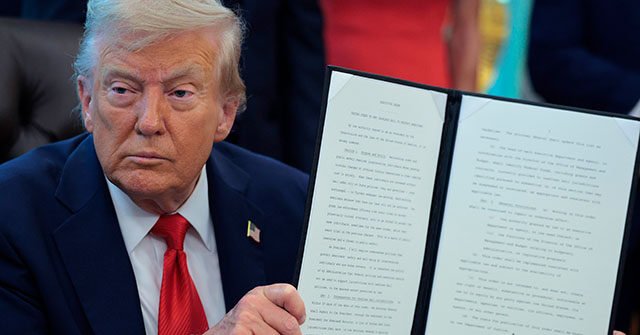Brett Tolman, former U.S. Attorney for Utah and chair for Law and Justice at the America First Policy Institute, discussed President Donald Trump’s new executive order on cashless bail during an exclusive interview on Breitbart News Daily, outlining the legal system’s challenges and how the policy could impact states and local jurisdictions.
The discussion came as Trump is expected to sign an executive order directing federal agencies to review jurisdictions that have adopted cashless bail, a policy that has drawn renewed scrutiny following reports of a 23-year-old Ukrainian refugee fatally stabbed at a North Carolina train station by a repeat offender.
Tolman outlined the purpose of bail in the U.S. legal system: “When an individual gets arrested, they’re accused of a crime, they’re brought in before the judge, the judge can decide, in most instances, to set bail … it’s a way to ensure that the individual shows up to all the hearings.”
RELATED VIDEO — Trump: Death Penalty for Murder in Washington, DC:
Cashless bail, he noted, was originally intended to help low-level, non-violent offenders who lacked financial resources avoid prolonged detention before trial. “It developed in order to not punish someone that doesn’t have resources. But what’s happened is it has been abused,” Tolman said, pointing to Washington, DC, New York, and Los Angeles as examples of cities where the practice has been expanded to defendants considered dangerous.
Tolman contrasted state systems with the federal model, where bail is largely eliminated. Federal judges determine pretrial detention by assessing if an individual poses a danger or flight risk. “They really don’t have bail. What they do is every individual … comes in front of the judge, and there is an assessment on whether they’re a danger to society or to themselves, and if they are, they’re in custody, and if they aren’t, then they can be released,” he warned.
LISTEN:
Tolman also cited Texas as an example of reform. The state amended its constitution to allow courts to deny bail when defendants are deemed dangerous. “Now they’re saying, no, if you’re dangerous and we know you’re going to go out and harm people … the judge can say, I’m going to hold this individual in custody until trial,” he stated.
Prosecutors, Tolman emphasized, play a central role in bail outcomes. “When you have a process… like we’ve seen over the last several years, developing these rogue prosecutors who announced that they’re not going to prosecute certain crimes … they’re just endangering their environment,” he explained, arguing that prosecutors’ decisions directly influence what information judges receive in bail hearings.
RELATED VIDEO — Trump Is Saving the U.S. Capital:
Trump’s executive order directs federal agencies to compile a list of jurisdictions that have adopted or abused cashless bail systems and match those findings against federal funds, grants, and contracts. “He doesn’t have the power to order all the different executives, the governors, and the prosecutors,” Tolman remarked. “But what he does hold is a massive hammer in which he can say, if you’re going to keep doing this … I’m going to pull massive amounts of money that you rely on. And that’s how he’s getting the attention.”
Tolman suggested that officials in cities most affected by rising crime may be forced to reconsider their bail policies if federal funding is withheld. “If he’s going to pull funding, we’ve got to make some changes and get the dangerous individuals off and stop letting them out to continue to commit crime,” he commented, predicting that leaders in places like Chicago and Los Angeles would feel pressure to adjust their approach in order to retain resources.
Asked about long-term solutions, Tolman called for more accountability. “They need a demand from their prosecutors that they give judges the evidence of how dangerous individuals are … Rise up and vote them out if they won’t do it. We’ve got to push back on all those Soros prosecutors. Get them out of office, get individuals that care about keeping our community safe,” he concluded.
Read the full article here


